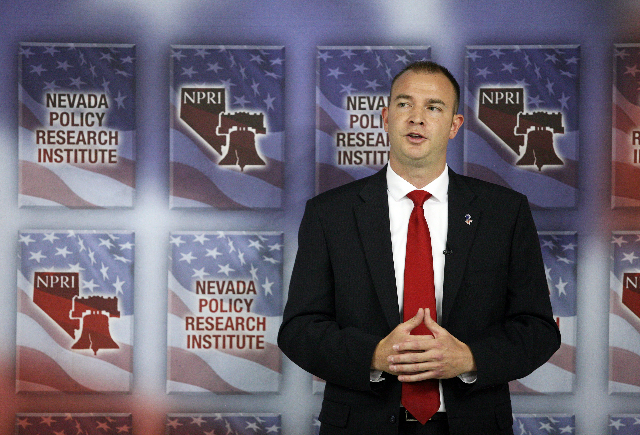Salary payments in congressional race raise questions
Ask anybody who's ever done it: Running for Congress is a lot of hard work.
So why not get paid for it?
Review-Journal political reporter Ben Botkin this week uncovered the fact that Republican Congressional District 3 candidate Andy Matthews has been paying himself a salary out of the $137,000 he's raised for his bid.
Thus far, Matthews has earned $11,600 from his campaign's coffers.
The revelation has sparked more than a little outrage on the left, which could not resist pointing out Matthews — in his former job as president of the Nevada Policy Research Institute — was a big critic of government salaries for public employees. NPRI keeps track of those salaries with near-Talmudic precision on a website devoted to transparency.
But that particular criticism of Matthews is misplaced: Campaign funds are not taxpayer dollars. They're non-tax deductible, voluntary contributions given by willing donors to a particular individual. (You could cogently argue that perhaps at least some of Matthews' donors didn't expect their contributions to end up in the candidate's pocket, however.)
No, the primary reason Matthews is wrong to pay himself a salary is that the practice apparently violates Federal Elections Commission guidelines. Those rules say candidates can only pay themselves salaries after the filing deadline for the office they're seeking. That doesn't happen until March.
Matthews told Botkin his campaign called the FEC to ask about salaries, and was told it was OK. But even if that phone call took place, and somebody employed by the FEC gave that advice, the guidelines are clear. (And those guidelines exist to prevent precisely this sort of … let's generously call it a misunderstanding.)
Matthews says he's going to continue paying himself, which leaves him open to an FEC complaint. But why not? A guy's got to pay his rent, and even if a complaint is filed and sustained, there's plenty of money to cover an FEC fine.
But that's not to say none of the criticism leveled at Matthews has merit. There is something delicious about a guy paying himself to run for political office when that same person formerly headed an organization that constantly questions the propriety of salaries paid under union-negotiated contracts to hard-working public employees such as firefighters, teachers and cops. What Matthews is doing is certainly legal (after the filing deadline, that is). And it's certainly been done before, by Democrats and Republicans. But because of the job Matthews gave up to run for office, this is one of those rare occasions in politics where the personal really is political.
Marijuana vote
After enjoying widespread support in Oregon, Washington state, Colorado, Alaska and Washington, D.C., legalized recreational marijuana hit a snag on Tuesday when Ohio voters said no.
Does this mean voters are starting to reconsider what until now has been a steady march to make marijuana legal? Not necessarily.
The Ohio measure wasn't just about legalization. It would have created a system in which 10 facilities in the state would have had the exclusive rights to peddle legalized marijuana. And as we've seen from Nevada's own plodding progress in legalizing and distributing medical marijuana, granting a small number of exclusive franchises creates a host of new problems.
Nevada voters will get their chance to legalize recreational marijuana come November 2016. Under the initiative, existing medical marijuana facilities and liquor distributors will be first in line to sell legal weed if voters approve the measure.
We'll be better able to determine then whether Ohio's vote was a reversal in America's changing attitudes toward marijuana, or whether it was more likely an outlier.
— Steve Sebelius is a Review-Journal political columnist and co-host of the show PoliticsNOW, airing at 5:30 p.m. Sundays on 8NewsNow. Follow him on Twitter (@SteveSebelius) or reach him at 702-387-5276 or SSebelius@reviewjournal.com.






















